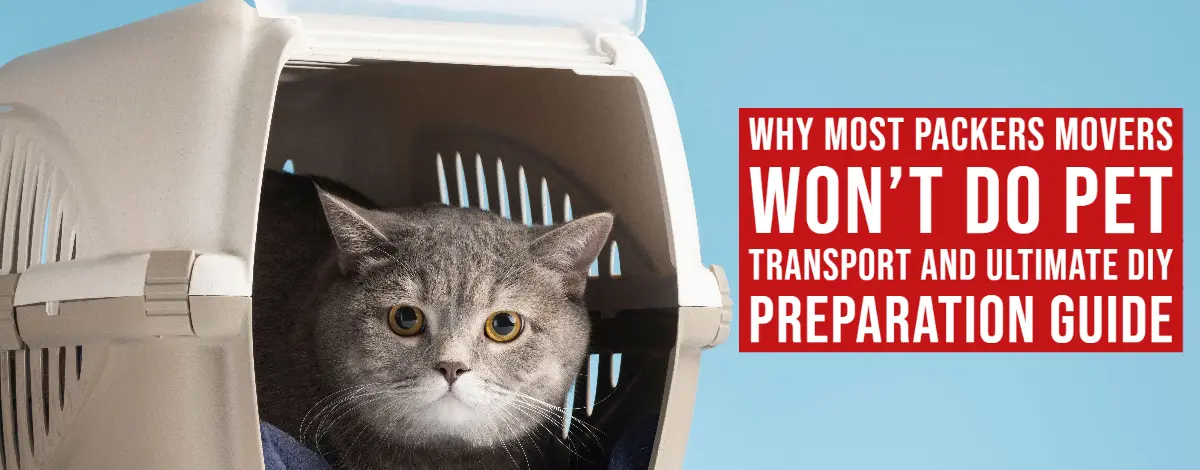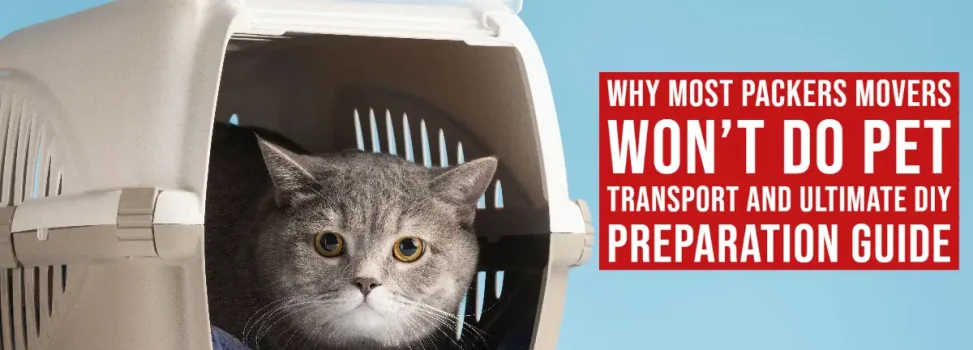Packers and movers are necessary for a comfortable shift; but, if you are a pet owner looking to relocate your pet, sometimes packers and movers may not be the best choice to hire. Here we’ll discuss why most packers and movers don’t transfer pets and how to prepare your pets for a DIY move.
Here are some main reasons why packers and movers might not be okay transporting your pet
Why Most Packers Movers Won’t Do Pet Transport
- Pets may not be at ease with others; they are generally at ease with their guardians, and a shift in environment and individuals might be stressful for the pet. They may get anxious and become uneasy with the person who is transporting them.
- They may not appreciate the trip with a newcomer; most pets are anxious, fail to perform well, and become sick.
- Not every person is a pet enthusiast; they are unable to approach your pet as lovingly as you do.
- Many pets have specific requirements, such as food, medications, and sensitivities that only the owner is aware of.
- Shifting a dog can be filthy and challenging for packers and movers, so they ignore it.
When shifting, we recommend that you always transport your pet in your car or other method of transportation. In this manner, the pet will receive the safety they require and will be better cared for. Always have your pet checked out by a veterinarian before moving, and ask them whether your pet is sufficiently sound to travel and shift.
The Ultimate DIY Pet Preparation Guide:
1. To prevent the discomfort of your pet, don’t modify your routine:
Pets, particularly dogs and cats, are animals of routine. The more your busy life varies, the more anxious you are going to become.
When you’re on an important role with luggage or organizing your to-do list, it can be appealing to forego the daily habits with your pets, but the slight distraction to your workflow now can pay off with a calmer pet in the long term.
To prevent your pet from levels of anxiety in the few days preceding the relocation (and, if possible, on the day of the relocation itself!), do what’s listed below:
Feed them at regular times. Relocation is tough for them as well! So shower them with additional affection and compassion.
2. Maintain your dog’s interest by doing the following:
You’ll be busy when you’re shifting, but finding moments to interact with your dogs is crucial. Burning off all that worried tension is one of the finest medications for anxiety! A weary pet is a tranquil pet, making the entire trip a happier experience for everyone.
If you are simply too preoccupied to get in an additional walking or fun session, consider enlisting the assistance of a buddy to assist you and take your furry companion on some outside play sessions. Dog walking services are another excellent method to get your pet some fresh air and spend some time away from your stressful work.
Think about playing mental activities to maintain your pet’s interest in addition to other methods. They will be less likely to become restless and act inappropriately, and they will have more time to concentrate on other chores.
3. Contact your veterinarian:
- Vets are experts at assisting pets in dealing with difficult circumstances… particularly because most pets dislike their visits!
- It’s an excellent idea to schedule an appointment with your veterinarian a few weeks prior to your relocation, so you may conduct the following:
- Confirm that all vaccines are up to date and get a valid infectious disease vaccination certificate (if necessary).
- Keep in mind your pet is good and that you have any necessary prescriptions on hand with the goal that you can avoid the situation of an unexpected appointment during your most hectic period.
- Discuss prospective stress-reduction techniques or anxiety-relieving substances.
- If you are leaving your present neighborhood or city and may need to change veterinarians, obtain a copy of your pet’s health care records.
- If you haven’t located a new vet in your new neighborhood yet, approach your vet for suggestions.
- If you are moving out of state, inquire about further testing or vaccines.
4. Whenever you’re relocating to a new city, be aware of any new pet rules:
If you relocate to a new town, you do not wish to be surprised by leash and pet rules! Make sure you do your homework ahead of time so you understand what to anticipate. If you’re shifting into a new flat (or rental house), it’s critical to understand your lease’s pet policy. The final aspect you would like to experience is to be turned away because you have a pet!
Before your shift, it is an excellent plan to get fresh pet tags prepared. If your pet is microchipped, remember to keep the details up to date online.
5. To maintain your pet comfortable, protect them and keep them close:
Doors should be left open throughout the whole process of moving, and visitors will be coming and departing. Keep your pet safe so that he or she does not flee out of fear or bewilderment. Put them in a kennel or a separate locked room in a calm portion of the residence.
Avoid leaving your dog unsupervised in your new home’s garden while you settle in! Get the most recent photo on hand as well as new tags/microchips in the event they abscond.
6. Pack an additional emergency relocation box for your pet:
Eliminate the pressure of shifting for both you and your pet by packing and keeping all of your pet’s requirements ready. Water vessels, favorite toys, a comforter, food, treats, kitty litter, and other necessities are a wonderful place to start.
To assist with unforeseen clean-ups, keep a roll of tissue paper and throwaway baggies on hand.
7. Prepare your pet for a comfortable ride in your vehicle by doing the following:
The best spot for your pet is in the backseat, restrained by a seatbelt in their kennel or cage. In the event of a crash, ensure that seat belts are properly attached and that there are no unfastened items or crates that could fall and damage your pet. If you believe that putting a blanket over your pet’s box or carrier will assist with minimizing their nervousness (a must for our avian mates), you can do so.
How long will it take your pet to acclimate to your new house?
Although you may be enthusiastic for your pet to settle in and become acquainted with their new surroundings, there will be a modifications phase during which peculiar conduct is to be considered.
Your cat may go missing for a few days or fail to utilize the litter box. Dogs can experience problems in the house, and you can discover that your pet has lost its appetite.
You should be calm, and you must understand that this is natural and will pass. When your pet realizes they are in a secure location, they will return to their normal selves.
On the other hand, if your pet continues to exhibit indications of worry or unusual actions after a month, it may be time to consult with their veterinarian.
Whenever relocating your pet to the new house, keep in mind that you have settled in the house. Pets do not do well in new surroundings and environments; therefore, make your new home as warm and welcoming to your pet as possible.
Note:
When you’re contemplating a relocation, research residential movers prior to deciding on the best local moving company for you. It is critical that any moving companies you hire be aware of your pet’s demands. The moving company from 1Support recognizes the importance of quick, effective action in order to minimize the pressure on everyone on moving day, as well as the possibility of pet fleeing.
Read Also 🧐👉
- Best-Rated Packers and Movers in Hyderabad at Affordable Prices
- Best Packers and Movers in Bangalore with Transparent Charges
- Best Packers and Movers in Chennai with Charges Breakdown
- Reliable Packers and Movers in Pune – Quick, Safe & Budget-Friendly
- Affordable Packers and Movers in Visakhapatnam | Hassle-Free Shifting
FAQs
Pets will not be at ease with the new individual from the packers and movers. As a result, they may become frightened.
Because not all packers and movers love pets, the creatures may not receive affection and care from others. As a result, they may be stressful.
Some pets are more sensitive, and only the owner is aware of it. Packers and movers may be unaware of this. As a result, your pet may be concerned.
These are the main challenges of transporting pets with packers and movers.
Yes, when your pets are unfamiliar with packers and movers, it is a good idea to transport them in your own vehicle during a relocation.
Pets may feel uneasy about the relocation procedure. During your relocation, you must pay special attention to your pet’s routine in order to keep them feeling at ease.


